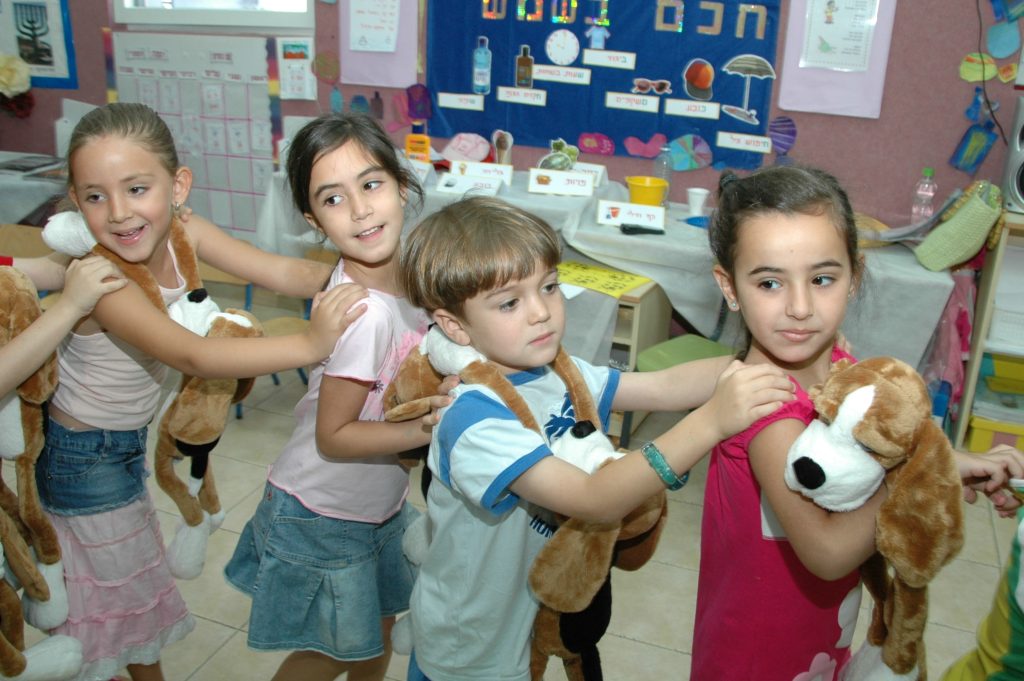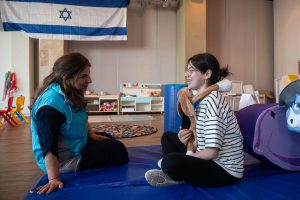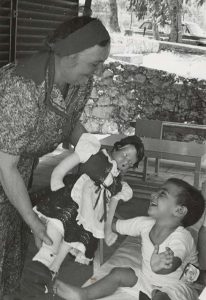- Pulished by
-
JDC at
-
November 21, 2023
Lending a Paw: Hibuki Therapy

Sderot, Israel, 2007. Photograph: Debbi Cooper
As you can imagine, the JDC Archives houses boxes of documents, photos, AV materials, and objects stacked on shelf after shelf in our physical collections, documenting JDC’s global assistance for over a century. But did you know that among the stacks, there lives a lone, sad-faced stuffed animal by the name of Hibuki?
Hibuki –– from “hibuk,” the Hebrew word for hug –– was developed by JDC in partnership with Tel Aviv University and the Israeli Ministry of Education during the Second Lebanon War in 2006 to help Israeli children displaced by rocket fire cope with trauma. This therapeutic toy – a dog with long arms that wraps around your neck while you hold him – allows children to process difficult emotions by projecting their feelings onto the animal and in caring for him, heal from fear and stress.
Over the past twenty years, tens of thousands of children in Israel, Japan, and those who fled Ukraine – who have faced conflict and natural disasters – have been comforted by Hibuki. And today, Hibuki is being deployed again among thousands of children from Israel’s south who endured the horrors of October 7. This is part of JDC’s wide-ranging response to the current crisis in Israel.

Israel, October 2023.
According to Israeli psychologist Dr. Shai Hen-Gal, who helped develop the doll in 2006, Hibuki has long arms to envelop a child with warmth and a sad, knowing face with heavy eyes, that sees the anguish of its owner. In addition to being able to project their negative feelings onto the stuffed animal, the child also becomes a caregiver to the puppy, which helps to reduce anxiety. In turn, their new active role combats their present pain. A symbiotic relationship emerges that allows for empathy and autonomy.
This is not the first time that JDC has harnessed the therapeutic power of dolls. As part of reconstruction efforts in the post-World War II period, JDC established work projects in the displaced persons (DP) camps of Germany, Austria, and Italy, aimed at providing productive work for 10,000 men and women. A doll shop was sponsored by JDC in Austria, effectively employing survivors. According to a report in the Archives, from September 1947 to April 1948, the doll shop “produced papier mâché heads and rag bodies” of “rabbis from Poland, demure peasant girls, bold Cossacks and smart-alecky Yeshiva students.” Over time, a simpler prototype developed of “leather and rag dolls and animals,” which were enjoyed considerably by the young recipients in the DP camps.

Be-er Yaacov, Israel, 1956. Photograph: Mirlin-Yaron Press Photography, Tel Aviv
Malben — a Hebrew acronym for Organization for the Care of Handicapped Immigrants, established in November 1949 by JDC, and the Israeli government, similarly employed individuals for craftwork. At several Malben homes for the elderly throughout Israel, residents learned new skills in the occupation room, including dollmaking. Some dolls were even distributed to patients at other Malben hospitals. Both in Austria and Israel, the dolls exhibited a dual relationship for both creator and recipient. A productive role and job that in turn sparked joy in the lives of hurt children, helping to heal and instill hope among those who had faced tragedy and despair.
Get updates from The Joint & JDC
It’s the easiest way to keep up to date with all our latest news, events and fundraising activities.
© 2024 The Joint Australia | Partner of American Jewish Joint Distribution Committee, Inc

